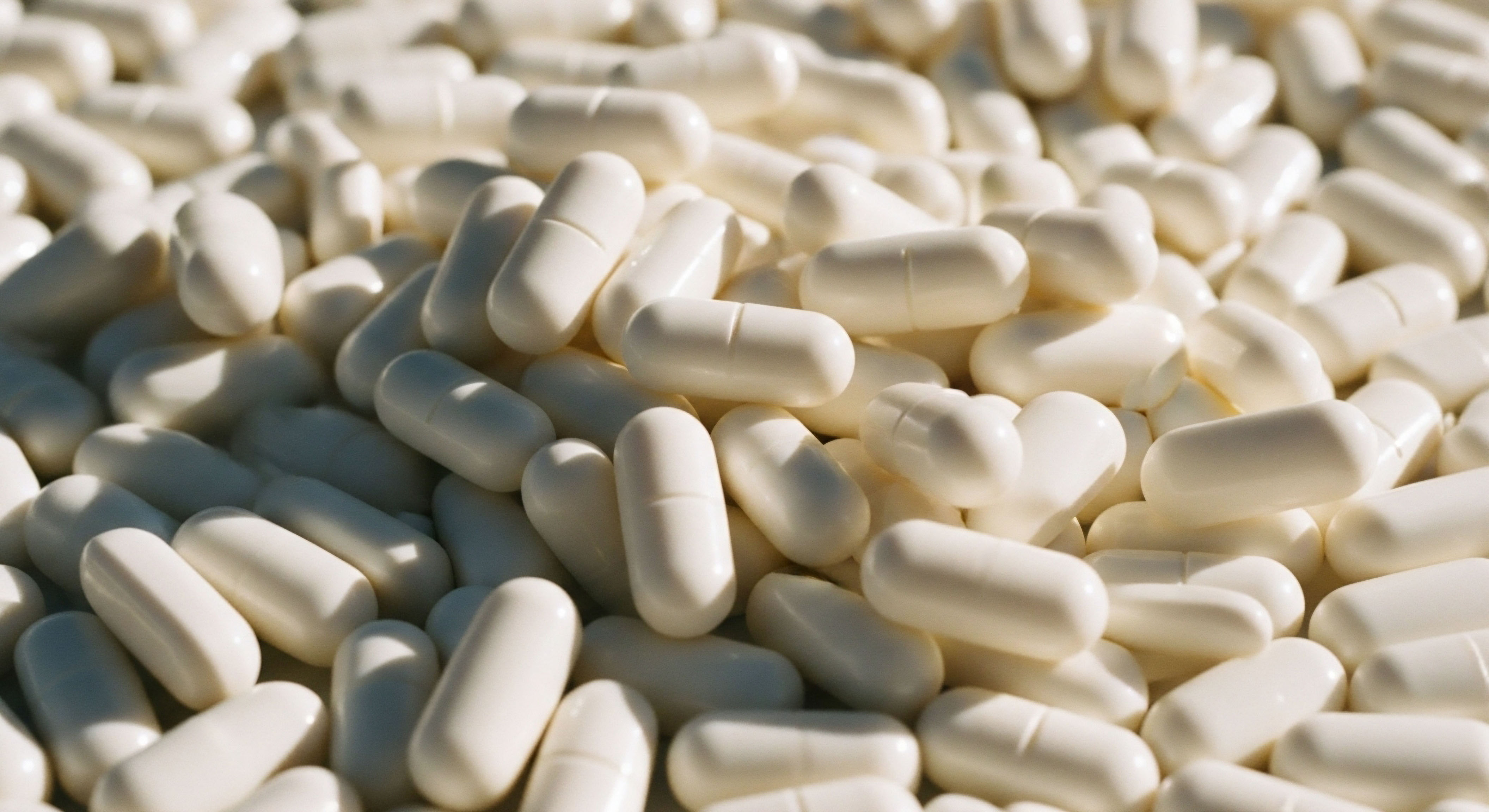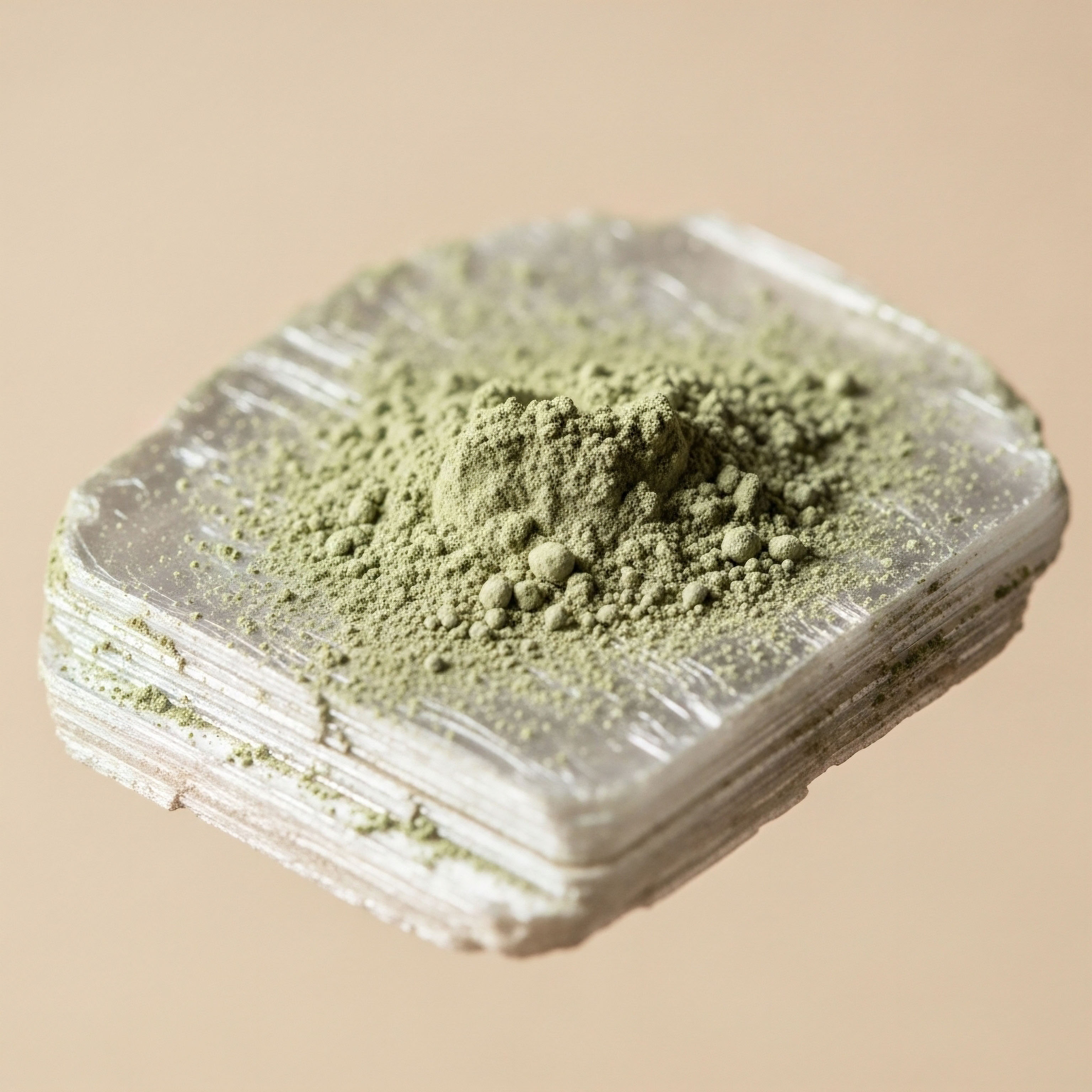

Fundamentals
Have you ever found yourself caught in a cycle of persistent tiredness, a subtle but pervasive fatigue that seems to defy explanation, even when you are actively pursuing hormonal optimization protocols? Many individuals embarking on a journey with biochemical recalibration, such as testosterone replacement therapy, report a disconnect between their efforts and their lived experience of vitality.
This sensation of being perpetually drained, despite therapeutic interventions, often points to an overlooked yet fundamental biological process ∞ sleep. The body’s intricate systems, particularly the endocrine network, rely heavily on restorative rest for proper function.
The human body operates on a delicate balance, a sophisticated internal messaging service where hormones act as crucial communicators. When this communication falters, the effects ripple through every aspect of well-being. Sleep, far from being a passive state, represents a period of intense physiological activity, a time when the body performs vital maintenance and regulatory tasks.
Disruptions to this essential process can profoundly alter hormonal rhythms, creating a cascade of effects that undermine even the most carefully managed endocrine system support.
Restorative sleep is a cornerstone of hormonal regulation, impacting the efficacy of endocrine system support.

Understanding Sleep’s Architecture
Sleep is not a monolithic state; it unfolds in distinct stages, each with a unique physiological signature and a specific role in biological recalibration. These stages cycle throughout the night, forming a predictable pattern. The two primary categories are Non-Rapid Eye Movement (NREM) sleep and Rapid Eye Movement (REM) sleep. NREM sleep is further divided into three stages, progressing from light sleep to deep, slow-wave sleep (SWS).
- NREM Stage 1 ∞ This initial phase marks the transition from wakefulness to sleep, characterized by slowed brain waves and muscle relaxation.
- NREM Stage 2 ∞ A period of light sleep, where heart rate and body temperature decrease, preparing the body for deeper rest.
- NREM Stage 3 (Slow-Wave Sleep) ∞ This is the deepest and most restorative phase of sleep, where brain waves are very slow (delta waves). During SWS, physical repair, cellular regeneration, and significant hormonal release occur.
- REM Sleep ∞ Characterized by rapid eye movements, increased brain activity, and temporary muscle paralysis. REM sleep is crucial for cognitive function, memory consolidation, and emotional processing. Testosterone production, for instance, typically peaks during the later stages of REM sleep.

Hormonal Regulation during Rest
The endocrine system and sleep share a bidirectional relationship. Optimal hormone production and regulation depend on adequate, high-quality sleep. Conversely, hormonal imbalances can significantly disrupt sleep patterns. Several key hormones exhibit a strong connection to sleep architecture:
Testosterone, a vital androgen for both men and women, demonstrates a circadian rhythm closely tied to sleep. Levels typically rise during sleep, reaching their peak in the early morning hours. Insufficient sleep, even for a short duration, can lead to a measurable decline in circulating testosterone.
A study involving healthy young men showed that a week of restricted sleep, limited to five hours per night, resulted in a 10-15% decrease in daytime serum testosterone levels, a reduction comparable to a decade of aging. This decline can manifest as fatigue, reduced muscle mass, diminished libido, and irritability.
Cortisol, the body’s primary stress hormone, also follows a distinct diurnal rhythm. Levels are typically lowest around midnight and gradually increase, peaking in the early morning to promote alertness. Sleep deprivation can disrupt this natural pattern, leading to elevated cortisol levels throughout the day. Sustained high cortisol can suppress testosterone production, interfere with recovery processes, and promote fat storage, particularly around the midsection.
Growth hormone (GH) is predominantly released during deep slow-wave sleep. This hormone is essential for tissue repair, muscle growth, fat metabolism, and overall cellular regeneration. A lack of quality sleep can significantly reduce the nocturnal release of growth hormone, impeding physical recovery and metabolic health.
The body’s hormonal symphony, including testosterone, cortisol, and growth hormone, orchestrates its most vital functions during the quiet hours of sleep.
The interconnectedness of these hormonal pathways means that a disturbance in one area can have far-reaching consequences. When sleep quality is compromised, the body’s ability to maintain hormonal equilibrium is challenged, setting the stage for a range of symptoms that can impact overall well-being. Recognizing this fundamental link is the first step toward understanding how to truly reclaim vitality.


Intermediate
For individuals engaged in hormonal optimization protocols, particularly testosterone replacement therapy, the impact of sleep quality extends beyond basic hormonal regulation. Sleep directly influences the effectiveness of these interventions and can modify the experience of therapy. Understanding how poor sleep interacts with prescribed agents provides a clearer picture of the body’s adaptive responses and helps refine personalized wellness strategies.

Sleep’s Influence on Therapeutic Efficacy
Testosterone replacement therapy aims to restore circulating testosterone levels to a physiological range, alleviating symptoms associated with androgen deficiency. While TRT can improve energy levels, mood, and sexual function, its full benefits may be attenuated by persistent sleep disturbances. The body’s response to exogenous testosterone is not isolated; it is integrated within a complex neuroendocrine network that relies on consistent, restorative sleep.
Consider the administration of Testosterone Cypionate, a common form of testosterone used in therapy. This compound works by providing a steady release of testosterone into the bloodstream. However, the body’s natural testosterone production, which TRT aims to supplement or replace, is highly sleep-dependent. If sleep quality remains poor, the underlying mechanisms that regulate endogenous hormone synthesis and receptor sensitivity may not fully optimize, potentially limiting the therapeutic gains from the administered testosterone.
Poor sleep can diminish the effectiveness of testosterone replacement therapy by disrupting the body’s natural hormonal regulatory mechanisms.
One significant concern with poor sleep during TRT is the potential for exacerbation of obstructive sleep apnea (OSA). While TRT can sometimes improve sleep for those with low testosterone, high-dose treatments may increase the risk or worsen existing OSA.
Untreated OSA leads to fragmented sleep, intermittent hypoxia, and increased sympathetic nervous system activity, all of which can elevate cortisol levels and counteract the anabolic effects of testosterone. This creates a challenging cycle where TRT aims to improve well-being, but a concurrent sleep disorder, potentially worsened by therapy, undermines progress.

Interactions with Specific Protocols
Hormonal optimization often involves a combination of agents, each with its own physiological impact. The interplay between these medications and sleep quality is a critical consideration.

Male Hormone Optimization
Standard male hormone optimization protocols often include Testosterone Cypionate, typically administered via weekly intramuscular injections. To maintain natural testosterone production and fertility, Gonadorelin is frequently prescribed, often as subcutaneous injections twice weekly. Gonadorelin stimulates the pituitary gland to release luteinizing hormone (LH) and follicle-stimulating hormone (FSH), which in turn support testicular function. Some reports suggest that Gonadorelin can improve sleep quality by helping to balance hormonal rhythms.
Another component, Anastrozole, an aromatase inhibitor, is used to block the conversion of testosterone to estrogen, mitigating potential side effects such as gynecomastia or water retention. While beneficial for estrogen management, Anastrozole can sometimes cause sleep disturbances, including difficulty sleeping and insomnia, by altering estrogen levels. This highlights the need for careful monitoring and adjustment of protocols to balance therapeutic benefits with potential sleep-disrupting effects.
Enclomiphene may also be included to support LH and FSH levels, particularly in men seeking to preserve fertility while on TRT. The impact of Enclomiphene on sleep is less directly studied, but its role in modulating the hypothalamic-pituitary-gonadal (HPG) axis suggests an indirect influence on overall hormonal equilibrium, which can affect sleep.

Female Hormone Balance
For women, hormonal balance protocols also consider sleep. Testosterone Cypionate, typically in lower doses (0.1 ∞ 0.2ml weekly via subcutaneous injection), is used to address symptoms like low libido, fatigue, and mood changes. Just as in men, optimal sleep supports the body’s utilization of this exogenous testosterone.
Progesterone is prescribed based on menopausal status. Progesterone has known calming effects and can improve sleep quality for many women, particularly those experiencing sleep disturbances related to hormonal fluctuations. This makes it a valuable component in supporting overall well-being.
Pellet therapy, offering long-acting testosterone, provides a consistent hormonal delivery. However, if Anastrozole is used concurrently with pellets to manage estrogen conversion, the potential for sleep disruption from the aromatase inhibitor remains a consideration.
The table below illustrates the typical hormonal release patterns during different sleep stages, emphasizing the critical role of sleep architecture in endocrine function.
| Sleep Stage | Key Hormonal Activity | Physiological Impact |
|---|---|---|
| NREM Stage 1-2 | Initial decrease in cortisol, preparation for deeper hormonal shifts. | Relaxation, slowing of physiological processes. |
| NREM Stage 3 (SWS) | Peak release of Growth Hormone (GH). Significant testosterone production. | Physical repair, muscle growth, cellular regeneration, deep restorative processes. |
| REM Sleep | Continued testosterone production, modulation of cortisol. | Cognitive restoration, memory consolidation, emotional regulation. |
Maintaining consistent, high-quality sleep is not merely a recommendation; it is an integral part of optimizing any hormonal therapy. Without addressing sleep, individuals may find themselves chasing symptoms, rather than achieving the comprehensive vitality and function they seek.


Academic
The long-term effects of poor sleep on hormonal balance during testosterone replacement therapy extend into the complex interplay of neuroendocrine axes, metabolic pathways, and cellular signaling. A systems-biology perspective reveals that sleep deprivation does not simply reduce testosterone; it creates a state of systemic dysregulation that can compromise the therapeutic goals of TRT and contribute to broader health challenges.

Neuroendocrine Crosstalk and Sleep Deprivation
The intricate relationship between sleep and the endocrine system is mediated by central regulatory hubs, primarily the hypothalamic-pituitary-adrenal (HPA) axis and the hypothalamic-pituitary-gonadal (HPG) axis. These axes are interconnected feedback loops that govern stress response and reproductive function, respectively. Sleep acts as a powerful modulator of both.
Chronic sleep restriction significantly activates the HPA axis, leading to sustained elevations in cortisol. This chronic hypercortisolemia exerts a suppressive effect on the HPG axis, directly inhibiting the pulsatile release of gonadotropin-releasing hormone (GnRH) from the hypothalamus and subsequently reducing the secretion of luteinizing hormone (LH) and follicle-stimulating hormone (FSH) from the pituitary.
This suppression, often termed “functional hypogonadism,” can occur even in individuals receiving exogenous testosterone, as the underlying signaling pathways remain dysregulated. The body’s own attempts to produce testosterone are hindered, and the overall hormonal milieu becomes less favorable for optimal health.
Chronic sleep deprivation disrupts the delicate balance of neuroendocrine axes, impairing the body’s intrinsic hormonal regulation.
Furthermore, sleep deprivation alters the secretion patterns of growth hormone (GH). The majority of GH release occurs during slow-wave sleep (SWS). Sustained lack of SWS, a hallmark of poor sleep, leads to a significant reduction in nocturnal GH pulses.
This has implications for tissue repair, muscle protein synthesis, and fat metabolism, all of which are critical for individuals on TRT seeking to improve body composition and vitality. The anabolic benefits of testosterone are less pronounced when GH secretion is compromised.

Metabolic Consequences and TRT
The long-term impact of poor sleep extends to metabolic health, creating a synergistic negative effect with hormonal imbalances. Sleep deprivation is a recognized risk factor for insulin resistance, obesity, and Type 2 diabetes.
Poor sleep alters the balance of appetite-regulating hormones ∞ it increases ghrelin (a hunger-stimulating hormone) and decreases leptin (a satiety hormone). This hormonal shift promotes increased caloric intake and cravings for energy-dense foods, contributing to weight gain. Adipose tissue, particularly visceral fat, is metabolically active and can increase the conversion of testosterone to estrogen via the aromatase enzyme. This can complicate TRT management, potentially necessitating higher doses of aromatase inhibitors like Anastrozole, which themselves can impact sleep.
The table below summarizes the metabolic and hormonal changes associated with chronic sleep deprivation:
| Hormone/Metabolic Marker | Change with Poor Sleep | Long-Term Effect |
|---|---|---|
| Testosterone | Decreased levels, disrupted circadian rhythm. | Reduced muscle mass, low libido, fatigue, impaired TRT efficacy. |
| Cortisol | Elevated basal levels, altered diurnal pattern. | Increased catabolism, HPG axis suppression, central adiposity. |
| Growth Hormone | Reduced nocturnal pulsatile release. | Impaired tissue repair, reduced muscle synthesis, altered fat metabolism. |
| Insulin Sensitivity | Decreased. | Increased risk of Type 2 diabetes, metabolic syndrome. |
| Ghrelin | Increased. | Increased appetite, food cravings. |
| Leptin | Decreased. | Reduced satiety, increased risk of obesity. |

Targeted Peptides and Sleep Optimization
Beyond traditional TRT, specific peptide therapies offer avenues to support sleep architecture and hormonal balance. Growth hormone-releasing peptides (GHRPs) and growth hormone-releasing hormone (GHRH) analogs are particularly relevant.
Sermorelin and Ipamorelin, both GHRH analogs, stimulate the pituitary gland to release endogenous growth hormone. By promoting natural GH secretion, these peptides can enhance the depth and quality of slow-wave sleep, which is critical for physical recovery and cellular repair. Unlike direct GH administration, which can suppress natural production, these peptides work with the body’s own regulatory mechanisms, offering a more physiological approach to improving sleep-dependent GH release.
CJC-1295, often combined with Ipamorelin, also acts as a GHRH analog, extending the half-life of GHRH and providing a sustained stimulus for GH release. The combined effect can lead to more consistent improvements in sleep architecture and associated hormonal benefits.
Other peptides, such as Tesamorelin (a GHRH analog used for visceral fat reduction) and Hexarelin (another GHRP), also influence GH dynamics and, by extension, sleep quality. MK-677, an oral ghrelin mimetic, also stimulates GH secretion and can improve sleep architecture, particularly SWS.
The integration of these peptides into a personalized wellness protocol can address the downstream effects of poor sleep on hormonal health, supporting the body’s intrinsic capacity for repair and regulation. This comprehensive approach acknowledges that true vitality is achieved when all biological systems are in harmonious operation, with sleep serving as a foundational pillar.

References
- Leproult, R. & Van Cauter, E. (2011). Effect of 1 week of sleep restriction on testosterone levels in young healthy men. JAMA, 305(21), 2173-2174.
- Morgan, A. J. & Tsai, S. C. (2015). Sleep and hormonal secretion are tightly interconnected; hormonal dysregulation provokes sleep disorders, and the latter could also aggravate hormonal abnormalities. Sleep and Endocrinology.
- Pietrowsky, R. Meyrer, R. Kern, W. Born, J. & Fehm, H. L. (1994). Effects of diurnal sleep on secretion of cortisol, luteinizing hormone, and growth hormone in man. Journal of Clinical Endocrinology and Metabolism, 78(3), 683-687.
- Copinschi, G. Caufriez, A. & Leproult, R. (2022). Sleep, testosterone and cortisol balance, and ageing men. Frontiers in Endocrinology, 13, 989679.
- Weibel, L. Follenius, M. Spiegel, K. Gronfier, C. & Brandenberger, G. (1994). Growth hormone secretion in night workers. Chronobiology International, 11(3), 173-182.
- Kerkhofs, M. Van Cauter, E. & Van Onderbergen, A. (1995). Growth hormone-releasing peptide-6 stimulates sleep, growth hormone, ACTH and cortisol release in normal man. Neuroendocrinology, 61(5), 584-589.
- Spiegel, K. Leproult, R. & Van Cauter, E. (1999). Impact of sleep debt on metabolic and endocrine function. The Lancet, 354(9188), 1435-1439.
- Morgan, A. J. & Tsai, S. C. (2016). Changes in sleep patterns, including reduced sleep duration or altered circadian rhythms during exam periods, may affect thyroid hormone regulation. Disruptions in sleep patterns can impact the hypothalamic-pituitary-thyroid axis, potentially influencing Triiodothyronine levels.
- Vargas, I. & Lopez-Duran, N. L. (2014). Association between sleep duration and awakening cortisol level has been already reported. Based on a study conducted on 58 normal adults on the association among sleep, stress and cortisol awakening response, lower subjective total sleep time is significantly related to lower cortisol levels at awakening.
- Caufriez, A. & Copinschi, G. (2000). The impact of sleep on gonadotropin secretion. European Journal of Endocrinology, 142(6), 557-560.

Reflection

Reclaiming Your Biological Rhythm
The journey toward optimal health is deeply personal, a continuous process of understanding and responding to your body’s unique signals. The insights shared here regarding sleep’s profound influence on hormonal balance, particularly during testosterone replacement therapy, are not merely academic points. They represent a call to introspection, an invitation to consider how your daily rhythms might be shaping your internal landscape.
Perhaps you have experienced the frustration of feeling unwell despite adhering to a prescribed protocol. This exploration aims to provide a framework for recognizing the silent yet powerful role of sleep in that experience. It encourages you to look beyond isolated symptoms and appreciate the interconnectedness of your biological systems.

A Path toward Personalized Vitality
Knowledge is the first step toward empowerment. Armed with a deeper understanding of how sleep impacts your endocrine network, you are better equipped to advocate for your well-being and collaborate with your healthcare provider. This understanding allows for a more refined approach to personalized wellness, one that considers the foundational elements of rest alongside targeted biochemical recalibration.
Your body possesses an innate intelligence, a capacity for balance and vitality. By honoring the fundamental need for restorative sleep, you actively participate in restoring that intelligence. This is not about chasing a fleeting ideal; it is about cultivating a sustainable state of health where your biological systems operate in harmonious synchronicity, allowing you to reclaim your full potential for energy, clarity, and overall function.



